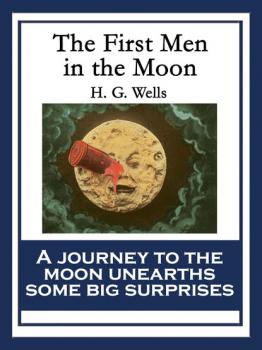ТОП просматриваемых книг сайта:















H. G. Wells
Список книг автора H. G. WellsАннотация
Compiled in one book, the essential collection of speculative science fiction books:<br><br>Looking Backward 2000-1887, Edward Bellamy <br>Flatland, a romance of many dimensions, Edwin Abbott Abbott <br>Utopia, Thomas More <br>Gulliver of Mars, Edwin L. Arnold <br>The Emerald City of Oz, L. Frank Baum <br>The Time Machine, H. G. (Herbert George) Wells <br>Anthem, by Ayn Rand <br>A Voyage to Arcturus, David Lindsay <br>20000 Leagues Under the Seas, Jules Verne <br>All Around the Moon, Jules Verne <br>The Brick Moon, Edward Everett Hale <br>The Land That Time Forgot, Edgar Rice Burroughs <br>The Lost Continent, Edgar Rice Burroughs <br>The Lost Continent, The Story of Atlantis, C. J. Cutcliffe Hyne <br>The Strange Case of Dr. Jekyll and Mr. Hyde, Robert Louis Stevenson <br>Tarzan of the Apes, Edgar Rice Burroughs
Аннотация
Although best known for his scientific romances that paved the way for the modern science fiction genre, H. G. Wells (1866-1946) produced significant works on politics, society, science and history. Fascinated as much with the real world as his imaginary one, and displeased with the quality of history textbooks at the end of World War I, Wells took on the task of writing his own book of world history. In 1919 he published «The Outline of History,» a 1,324-page book in three volumes, which he soon followed with the much shorter and highly popular work, «A Short History of the World.» This condensed work is a monumental account of the physical, spiritual, and intellectual evolution of the human race, and chronicles key events of humanity's development. More importantly, Wells brings to light the continuity of history, and provokes thoughts on the future implications of our scientific and intellectual progress.
Аннотация
H. G. Wells (1866-1946) is widely considered the father of the science fiction genre. His stories examine space and time travel, alien worlds, and the destructive potential of modern technology. Wells' influence is far reaching and remains potent today. «The Country of the Blind and Other Stories» collects thirty-three of Wells' most renowned short stories. In «The Country of the Blind,» perhaps his most famed shorter work, Nunez the mountaineer falls does the side of a mountain on an expedition only to discover an isolated valley with a mysterious populace where everyone is blind. In «The Crystal Egg,» an antiques dealer discovers a mysterious crystal egg that allows him to remotely view the planet Mars. «The Man Who Could Work Miracles» follows an individual whose supernatural talents gradually become problematic and even disastrous. These are only a few of the many exciting tales contained in this edition by England's most respected science fiction author.
Аннотация
One of the patriarchs of the science fiction genre, H. G. Wells (1866-1946) produced a vast collection of important works on the topics of scientific progress, politics, history and social commentary. One work in particular marked a watershed moment in the English author's career. With the publication of «When the Sleeper Wakes» in 1899, later republished under the title «The Sleeper Awakes,» Wells gave the world its first dystopia novel. The story concerns a Victorian Englishman who falls into a trance, and awakens to find himself in a terrifying London of the future. In what is essentially a story of radical socialism gone bad, this new, mechanized London has been reduced to a highly regimented society of mental and physical slaves under a totalitarian, power-hungry group of elite. His subsequent novels, including «The Time Machine,» «The Island of Doctor Moreau,» «The Invisible Man,» and «The First Men in the Moon,» continue Wells' exploration of social progress and the dark potential of science and technology.
Аннотация
"As I sit down to write here amidst the shadows of vine-leaves under the blue sky of southern Italy, it comes to me with a certain quality of astonishment that my participation in these amazing adventures of Mr. Cavor was, after all, the outcome of the purest accident. It might have been any one. I fell into these things at a time when I thought myself removed from the slightest possibility of disturbing experiences. I had gone to Lympne because I had imagined it the most uneventful place in the world. «Here, at any rate,» said I, «I shall find peace and a chance to work!» And this book is the sequel. So utterly at variance is destiny with all the little plans of men. I may perhaps mention here that very recently I had come an ugly cropper in certain business enterprises. Sitting now surrounded by all the circumstances of wealth, there is a luxury in admitting my extremity. I can admit, even, that to a certain extent my disasters were conceivably of my own making. It may be there are directions in which I have some capacity, but the conduct of business operations is not among these. But in those days I was young, and my youth among other objectionable forms took that of a pride in my capacity for affairs. I am young still in years, but the things that have happened to me have rubbed something of the youth from my mind. Whether they have brought any wisdom to light below it is a more doubtful matter." This Rediscovered edition also features the illustrations prepared for the first edition of this book, by Claude Allin Shepperson.
Аннотация
As I sit down to write here amidst the shadows of vine-leaves under the blue sky of southern Italy, it comes to me with a certain quality of astonishment that my participation in these amazing adventures of Mr. Cavor was, after all, the outcome of the purest accident. It might have been any one. I fell into these things at a time when I thought myself removed from the slightest possibility of disturbing experiences. I had gone to Lympne because I had imagined it the most uneventful place in the world. «Here, at any rate,» said I, «I shall find peace and a chance to work!» And this book is the sequel. So utterly at variance is destiny with all the little plans of men. I may perhaps mention here that very recently I had come an ugly cropper in certain business enterprises. Sitting now surrounded by all the circumstances of wealth, there is a luxury in admitting my extremity. I can admit, even, that to a certain extent my disasters were conceivably of my own making. It may be there are directions in which I have some capacity, but the conduct of business operations is not among these. But in those days I was young, and my youth among other objectionable forms took that of a pride in my capacity for affairs. I am young still in years, but the things that have happened to me have rubbed something of the youth from my mind. Whether they have brought any wisdom to light below it is a more doubtful matter.
Little Wars; a game for boys from twelve years of age to one hundred and fifty and for that more intelligent sort of girl who likes boys' games and books. - H. G. Wells
Аннотация
Little Wars; a game for boys from twelve years of age to one hundred and fifty and for that more intelligent sort of girl who likes boys' games and books by H. G. Wells libreka classics – These are classics of literary history, reissued and made available to a wide audience. Immerse yourself in well-known and popular titles!
Аннотация
THE INVISIBLE MAN is a science fiction novella by H. G. Wells. Originally serialized in Pearson's Weekly in 1897, it was published as a novel the same year. The Invisible Man of the title is Griffin, a scientist who has devoted himself to research into optics and invents a way to change a body's refractive index to that of air so that it absorbs and reflects no light and thus becomes invisible. He successfully carries out this procedure on himself, but fails in his attempt to reverse it. (more on www.wisehouse-classics.com)
Аннотация
THE TIME MACHINE is a science fiction novella by H. G. Wells, published in 1895. Wells is generally credited with the popularization of the concept of time travel by using a vehicle that allows an operator to travel purposely and selectively forwards or backwards in time. The term «time machine», coined by Wells, is now almost universally used to refer to such a vehicle. The book's protagonist is an English scientist and gentleman inventor living in Richmond, Surrey, in Victorian England, and identified by a narrator simply as the Time Traveller. The narrator recounts the Traveller's lecture to his weekly dinner guests that time is simply a fourth dimension, and his demonstration of a tabletop model machine for travelling through it. He reveals that he has built a machine capable of carrying a person through time, and returns at dinner the following week to recount a remarkable tale, becoming the new narrator. . . (more on www.wisehouse-classics.com)










